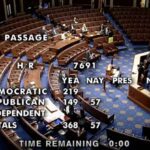Trending Now
World
11 Dead In South India Warehouse Fire
A fire broke out in a warehouse in the southern Indian state of Telangana in the early hours of the 23rd, killing at least...
US
Biden Says Putin Should Not Stay In Power
On the 26th, US President Biden suddenly declared that Russian President Vladimir Putin could not continue to be in power during a speech in...
China
132 victims of MU5735 air crash confirmed
At 5:00 p.m. on March 28, the China Emergency Response Headquarters held the ninth press conference on the flight accident of "3.21" China Eastern...
Military
Ukraine Decided To Confiscate Russian Assets On Its Territory
On May 11, the Ukrainian government adopted a document according to which Russian assets located in Ukraine will be confiscated and transferred to the...
More Than Half Of The $40 Billion U.S. Aid To Ukraine Is Military Aid
According to CNN, the U.S. House of Representatives passed a $40 billion aid package for Ukraine on May 10 with 368 votes in favor...
Ukraine Announces Partial Interruption Of Russian Gas Transmission
Ukraine's state-owned gas pipeline network operator GTSOU announced on May 10 on the company's website a force majeure that prevented further gas deliveries through...


































































